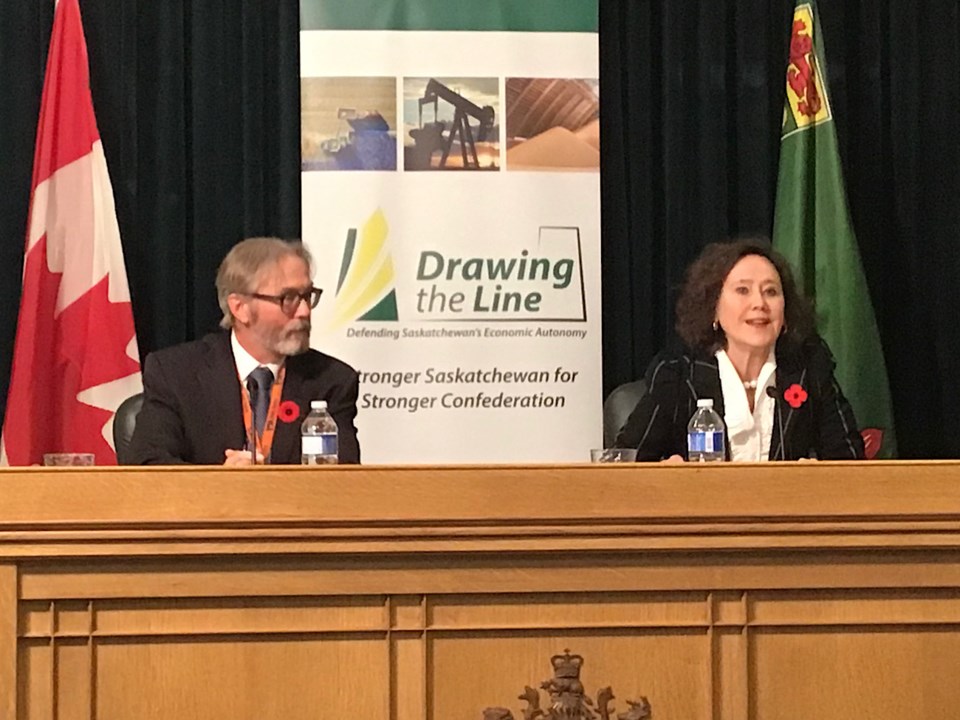REGINA - The much-anticipated Saskatchewan First Act has been introduced in the Legislature, as the province moves to assert its rights under the Constitution to protect the economy.
“Today in Saskatchewan we choose to dare, to assert, what is ours under the Constitution,” said Bronwyn Eyre, Minister of Justice and Attorney General, at an embargoed news conference on Tuesday morning.
Eyre said the Act was the result of many months of intense legal and economic analysis. It follows announcements from Premier Scott Moe over the last number of weeks including release of the Drawing the Line white paper in North Battleford in October. In releasing that white paper, the provincial government has argued federal policies could cost the province $111 billion by 2035 — an estimate challenged by some economists in recent weeks.
On Tuesday, Eyre told reporters the Sask First bill, at its root, “asserts Saskatchewan’s exclusive — exclusive — jurisdiction over natural resources which we must protect.”
She called natural resources a major reason why Saskatchewan was weathering the economic storm seen elsewhere, but noted economic success and strength “don’t just happen by accident.”
Eyre said the bill was about ensuring and protecting that, noting their economic success was “in spite of federal policies that have done real economic harm.”
“This bill will create the framework to define, address and quantify economic harm, because that harm is real and is being perpetrated on just one region. We’re tired of the double standards, and frankly the contempt for ordinary working people and their livelihoods.”
Constitutional amendment a key component of bill
There are a couple of main aspects to the Saskatchewan First Act. First, it will amend the Constitution of Saskatchewan to clearly confirm Saskatchewan’s autonomy and exclusive legislative jurisdiction over several areas.
Those where the province is asserting exclusive jurisdiction include exploration for non-renewable resources; the development, conservation and management of non-renewable natural resources, and also for forestry resources in Saskatchewan; and operation of sites and facilities for the generation and production of electrical energy.
Section 4 of the legislation will amend the Saskatchewan Act — the amendment to Saskatchewan’s constitution — to add Section 3.1 which states Saskatchewan has autonomy with respect to all matters falling under its legislative jurisdiction pursuant to the Constitution Act, 1867.
This amendment is being done by virtue of s.45 of the Constitution Act, which Eyre said provides that a provincial legislature can unilaterally amend its Constitution.
“By that means we are asserting our provincial Constitutional jurisdiction, enumerating our core provincial powers, and referring questions of economic assessment to an independent economic tribunal,” said Eyre.
“This is not merely symbolic. Amending our Constitution, as Quebec did, as the Prime Minister said it was within the power of provinces to do, and enumerating our core provincial powers, in other words only those that relate specifically to Saskatchewan, we believe will have real practical and legal effect and weight in the future.”
The Sask. First Act also defines Saskatchewan’s “core powers.” Under the wording of s.3 of the Sask. First Act, “Saskatchewan asserts its exclusive legislative jurisdiction under the Constitution of Canada, and in particular, those matters listed in sections 92 and 92A of the Constitution Act, 1867.”
Saskatchewan also asserts under the Act that the doctrine of interjurisdictional immunity applies to exclusive provincial legislative jurisdiction to the same extent that it applies to exclusive federal legislative jurisdiction.
The province’s powers under section 92 of the Constitution are nothing new.
“Exclusive jurisdiction under 92A has been in place for a very long time,” Eyre told reporters. “We are merely asserting that that is in the Constitution and that quantifying the impact of infringement into that exclusive jurisdiction… will potential help establish a legal basis for challenging.
“But keep in mind, this isn’t about going against the law but asserting what’s in the constitutional law.”
Economic Impact Assessment Tribunal being established
The second aspect of the new legislation is creation of an Economic Impact Assessment Tribunal.
The legislation states it is being established for the purpose of conducting economic impact assessments in relation to federal initiatives. According to the province this tribunal will define and quantify, and report on economic repercussions of federal initiatives on provincial investments and on Saskatchewan projects and businesses.
It was noted at the news conference that the work of the tribunal will be vitally important. Eyre told reporters assessing economic harm, and putting a dollar figure on it, will help identify evidence for potential future cases and help overcome what can be challenging legal thresholds.
Eyre pointed to the legal tests for interlocutory injunction, noting that one test is establishing irreparable harm.
Both Eyre and Director of the Constitutional Law Branch, Mitch McAdam, expressed confidence that the Sask First Act legislation will hold up in the courts. Eyre also challenged the notion that what the legislation was seeking to accomplish was somehow un-Canadian
“Is it not patriotic to ask for a fair deal, to rely on the strict interpretation of the division of powers in the Constitution, and to ask that the federal government be an honourable partner with Saskatchewan. That to me, defines being Canadian.”





